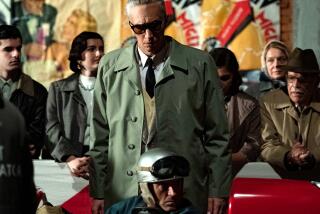A Second Look: Luchino Visconti’s ‘Senso’
- Share via
The standard line on the career of Luchino Visconti is that he went from being one of the founding fathers of Italian neorealism to a master orchestrator of sumptuous historical melodramas. This shift is often viewed as a contradiction — one of several that defined Visconti, a bisexual Marxist aristocrat — and some even called it a betrayal, a turn from the present-day, working-class environments in which such early films as “La Terra Trema” were set to the titled, moneyed world of the past from which he came.
To the extent that Visconti’s filmography can be said to have a turning point, it would be “Senso” (1954), the heady story of a tortured romance set during the Risorgimento, the long struggle toward unification that convulsed the Italian peninsula in the 19th century. (Digitally restored by the Film Foundation in 2009, the film is being issued in regular-definition and Blu-ray formats by the Criterion Collection this week.)
Visconti’s family fortune meant that he could avoid artistic compromises, but he faced his share of professional obstacles, from battles with Italian censors to botched and butchered releases of some of his major films. “Senso” did not even open in the United States until 1968 — years after the more successful “Rocco and His Brothers” (1960) — and it has always been overshadowed by what for many remains Visconti’s greatest work, “The Leopard” (1963), set a few years before “Senso” in 1860, during the twilight of Sicily’s rule by the Bourbon nobility.
“Senso” would likely be a better-known film today had Visconti cast the stars he originally had in mind, Ingrid Bergman and Marlon Brando, to play Livia, an Italian countess, and the Austrian lieutenant Franz Mahler, who tumble into a headlong affair on the eve of an Italian revolt against the Austrian occupiers. But Visconti’s colleague Roberto Rossellini refused to let Bergman, his wife at the time, work with another Italian director, and the producers nixed Brando in favor of Farley Granger, best known for the Hitchcock films “Strangers on a Train” and “Rope.” (Alida Valli was cast as Livia.)
“Senso” could be described as an agonized love story that unfolds against a vast historical backdrop. But Visconti’s great achievement here is in giving equal importance to both the romance and the history — in fact, in linking the actions and fates of his characters to forces larger than themselves. Just as Rossellini, another neorealist pioneer, concluded his career with a series of pedagogical films that probed the lives and ideas of great leaders and thinkers, Visconti wrestled increasingly with the responsibilities and implications of depicting history.
For one thing, he understood that to portray the past could also mean engaging with the present. (A point of comparison: Marco Bellocchio’s “Vincere,” a recent Italian film that evokes “Senso” in its melodramatic sweep, is a film about Mussolini that has been interpreted as a critique of Berlusconi.) Sensitive to depictions that might undermine the official myths of Italian history and apparently wary that the portrayal of the Italian army in relation to the popular resistance movement might resonate with the more recent history of the Fascist period, the authorities insisted that Visconti trim several scenes, including one in which an Italian officer dismisses the usefulness of volunteer forces.
Opening at the Venetian opera house La Fenice, where the climactic call-to-arms of Verdi’s “Il Trovatore” prompts the Italians in the balconies to pelt the Austrian officers in the stalls with tricolor leaflets and flowers, “Senso” makes an explicit connection to the art form most commonly invoked to describe Visconti’s later films. (The extras on Criterion’s two-disc set include the English-language version of the film with dialogue by Tennessee Williams and Paul Bowles as well as a visual essay by scholar Peter Cowie and two new documentaries, one focusing on the importance of opera to Visconti — he grew up attending productions at Milan’s famed La Scala.)
From the lived-in opulence of the sets to the detail of the landscapes (now restored to their painterly richness), “Senso” makes clear that for Visconti, stylized grandeur and scrupulous naturalism were not incompatible. He was among the toughest to peg of the great filmmakers and the contradictions of his life sometimes extended to his art. But at his best, Visconti made films that treated melodrama and realism not as mutually opposing forces but as mutually enriching ones, large and vital enough to encompass one another.
More to Read
The biggest entertainment stories
Get our big stories about Hollywood, film, television, music, arts, culture and more right in your inbox as soon as they publish.
You may occasionally receive promotional content from the Los Angeles Times.










